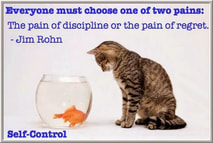|
Galatians 5:22-23– But the fruit of the Spirit is love, joy, peace, patience, kindness, goodness, faithfulness, gentleness, self- control; against such things there is no law.NASB Every behavior has either a good or bad consequence. If we are kind to to others,our relationships are enhanced.If we work hard at school and study we will have good grades; If we go to work we get paid; if we are a good employee we will likely get promoted. Of course, if we don’t do these things, we will most likely get the negative results: poor grades, no paycheck and bad relationships. These are natural consequences of our behavior. The problem comes when someone interrupts the law of sowing and reaping in another’s life. A person’s drinking or abuse should have consequences for the drinker or the abuser. “Stern discipline awaits him who leaves the path” (Prov. 15: 10). To rescue people from the natural consequences of their behavior is to render them powerless. This happens a lot with parents and children. Parents often yell and nag, instead of allowing their children to reap the natural consequences of their behavior. Parenting with love and limits, with warmth and consequences, produces confident children who have a sense of control over their lives. We need to take responsibility for our choices. This leads to the fruit of “self-control” (Gal. 5: 23). A common problem people have is disowning their choices and trying to lay the responsibility for them on someone else. Just remember the classic Adam and Eve cop-out line: The man said, “The woman whom you gave to be with me, she gave me fruit of the tree, and I ate.” 13 Then the Lord God said to the woman, “What is this that you have done?” The woman said, “The serpent deceived me, and I ate (Genesis 3:12-13 ESV) Think for a moment how often we use the phrases, “I had to” or “She (he) made me” when explaining why we did or did not do something. These phrases betray our basic illusion that we are not active agents in many of our dealings. We think someone else is in control, thus relieving us of our basic responsibility. We need to realize that we are in control of our choices, no matter how we feel. This keeps us from making choices to give “ reluctantly or under compulsion,” as 2 Corinthians 9: 7 says. Paul would not even accept a gift that he felt was given because the giver felt he “had to” give it. He once sent a gift back so “that any favor you do will be spontaneous and not forced” (Philemon 1:14). Joshua said the same thing to the people in his famous “choice” verse:“But if serving the Lord seems undesirable to you, then choose for yourselves this day whom you will serve” (Josh. 24: 15). Jesus said a similar thing to the worker who was angry about the wage for which he had agreed to work: “Friend, I am not being unfair to you. Didn’t you agree to work for a denarius?” (Mat 20: 13). The man had made a free choice to work for a certain amount and was angry because someone who worked fewer hours got the same wage. Another example is the prodigal son’s brother, who had chosen to stay home and serve and then was resentful. Not satisfied with his choice, he needed to be reminded that he made a choice to stay home.
Choices, Choices, Choices. If anything,today with the proliferation of knowledge and nearly everyone carrying a device to access most of those choices, our world today is full of WAY TOO MANY choices. But If we live out of a solid conviction about certain things, most of your choices are already made for us: Immorality is NOT an option. Divorce is NOT an option. Murder is NOT an option. Slander and Gossip is NOT an option. Debt is NOT an option.Outbursts of anger are NOT an option. Think about it- isn’t the fruit of self-control really just describing someone who has already made many and most of the right choices out of their convictions, so they seem so solid. Self-controlled people are the most dependable people. You can be a choleric or phlegmatic temperament and be self-controlled. Want to find the most stable people in your church? Look for those with the most self-control. |
AuthorPastor Marc Lawson Archives
July 2018
Categories |
AboutThere are 168 hours in every week. The 166 Factor is the answer to the question: "Who are you the OTHER 166 hours a week when you are NOT in church?" Join the community here as we will be discussing this and other topics related to Reformation in the Church, The End of Church (As We Know It) & The 166 Lifestyle.
|
|



 RSS Feed
RSS Feed